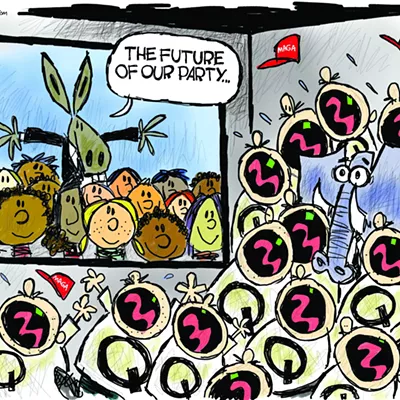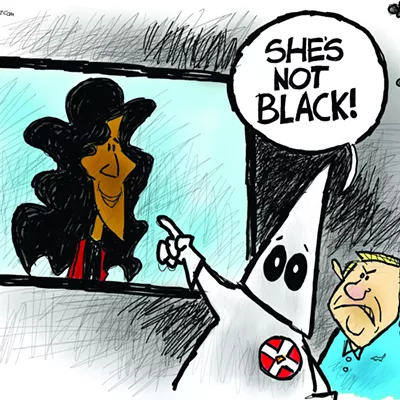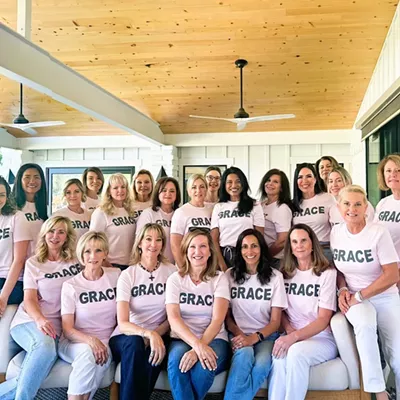OPPONENTS OF PROP 202 are keeping their promise to spend a bundle to defeat the Citizens Growth Management Initiative.
As of this week, Arizonans for Responsible Planning has raised more than $2.1 million, primarily in stuccodollars. That's up from the $1.8 million the group had raised as of August 23. In the five weeks since, contributors have thrown in at least another $334,100 in contributions of $10,000 or more, according to figures posted on the Secretary of State's website.
Those large contributions of $10,000 or more--nearly all of which have come from development, real estate or construction interests--total at least $1.7 million. Those same industries have turned in more than 75 percent of the known contributions to this date.
The largest single contributor has been a group of literal cementheads. The Arizona Rocks Product Association, a group of companies that deals in concrete, gravel and rocks, has shoveled in at least $404,000.
Among other expenses, the group is running a television advertising blitz attacking the initiative. The big spending may be having an impact: an Arizona Republic poll released earlier this week showed support for the initiative had dropped to 62 percent--down from the roughly 68 percent it had enjoyed in an earlier poll.
The group backing the initiative, Citizens for Growth Management, had raised $331,742 as of August 23. In comparison to the big dollars coming from the Growth Lobby, of Citizens for Growth Management's 1,500 contributions, about 67 percent were $25 or less.
"Our campaign has raised almost $19,000 in contributions of $25 or less and they have raised about $1,600 at that same level," says Sandy Bahr, the legislative lobbyist for the Sierra Club, which has contributed roughly $105,000 to the campaign.
"We're out there, talking to lots of people, getting support from a lot of individuals and being honest that we've gotten some large contributions from conservation organizations, but there's not the same kind of vested interest, nor are the numbers even close," says Bahr, who chuckles at the thought of the opposition calling itself a "grassroots organization."
"It's the best grassroots money can buy," Bahr says.
In other campaign finance news: · The Healthy Children, Healthy Families Committee, which is backing Prop 200, reported raising $971,329 as of August 23. Prop 200, which would provide health care for uninsured children and their parents, is financially backed primarily by hospitals across the state, including Tucson Medical Center ($25,000), University Medical Center ($25,000) and the Arizona Hospital and Healthcare Association ($250,000). The group had spent $823,436 by the end of the reporting period.
· The competing health care initiative on the November ballot, Healthy Arizona 2 (Prop 204), had raised $265,850 by August 23. The largest contributor to the campaign has been El Rio Neighborhood Health Center, which had contributed $95,000. Since the end of the reporting period, the group has received at least $155,000 in contributions of $10,000 or more, including $100,000 from El Rio Santa Cruz Neighborhood Health Center, $30,000 from the Arizona Association of Community Health Centers, and $25,000 from the Salt River Pima-Maricopa Indian Community.
· The Fair Districts, Fair Elections committee, which is pushing Prop 106, an initiative that would strip lawmakers of the power to draw legislative and congressional districts and transfer it to an appointed committee, had raised $425,069 and spent $420,846. The primary contributor is Jim Pederson, a Phoenix developer who has given at least $347,000 to the effort.
· The English for the Children-AZ committee, which is pushing Prop 203, which would ban bilingual education in Arizona, reported raising $170,057, most of which had been spent gathering signatures for the initiative. All but $250 came from English for the Children-CA, a California political action group funded primarily by entrepreneur Ron Unz, which ran a similar campaign in California in 1998.
· Az for Consumer Choice and Fair Competition is now a wholly-owned political subsidiary of Qwest, the faceless corporation that recently swallowed up US West. U S West paid for the first $1,327,428 this initiative has cost, while Qwest has now kicked in $400,000. The phone company is trying to convince voters it no longer needs to be regulated by the Arizona Corporation Commission.
The opposition, Arizonans Against Higher Phone Rates and Poor Service, has collected $100,000 from Cox Communications and $50,000 from AT&T.
For more in-depth info on campaign finance reports, visit the Secretary of State's website at www.sosaz.com.











